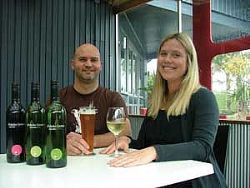Seeing The (Green) Light
There is no denying that more environmentally products and services are available today than ever before and it can be argued that there is a lot of ‘greenwashing’ going on in the marketplace. A new breed of entrepreneurs is recognising opportunities for new ventures that cater to the increasing consumer demand for eco-friendly products and services. These are the people we call ‘ecopreneurs’ – entrepreneurs who start businesses not only to make profits, but they also have strong underlying green values.
There is no denying that more environmentally products and services are available today than ever before and it can be argued that there is a lot of ‘greenwashing’ going on in the marketplace. A new breed of entrepreneurs is recognising opportunities for new ventures that cater to the increasing consumer demand for eco-friendly products and services. These are the people we call ‘ecopreneurs’ – entrepreneurs who start businesses not only to make profits, but they also have strong underlying green values. Little is known about ecopreneurs, so in order to learn more we recently interviewed 14 ecopreneurs around New Zealand. They represent a range of industries, from wind and solar energy, to skincare, dairy products, beer, honey and organic produce. These ecopreneurs run service companies such as taxi services, architecture and cleaning companies. They employ on average five full-time staff and 0.5 part-time workers. Half of the businesses have annual sales of less than $100,000 and only three businesses had sales over $1 million – partially due to the newness of the business. The majority had been in business less than three years. Barriers to adoption of green products/services Ecopreneurs believe that people adopt their products because of their environmentally friendly characteristics, for health reasons or because it is a better product than currently on offer. Price and government regulations or company policies also play a part in why people choose to buy green products and services. However, there are two main barriers that ecopreneurs face in getting their products and services accepted – a lack of awareness, and price. First, there was a perceived lack of awareness about the benefits of eco-friendly products and services in eight cases. For some, this lack of understanding and awareness was due to the recent trend towards more eco-friendly products and services. One ecopreneur noted the effect of this emergence has been a delay in adoption. “It’s such a new concept that it’s taken a while for people to actually become aware of it and be interested in it and through getting customers.” Interestingly, most of the ecopreneurs appear to relate to this lack of awareness of the benefits of their offerings. One said that his customers had to believe in his vision. “I mean there’s a huge leap of faith on the part of the client really.” Half of the ecopreneurs believe the price of their products and services was a barrier to customers adopting them. Customers are also price conscious. The following quote illustrates this viewpoint: “There are not enough people that would be prepared to pay a premium just because it’s the right thing to do. They have to still see that it is a good product.” This recognition of price consciousness led to one ecopreneurial business offering some flexibility with their offerings to fit in with customer’s individual budgets. Adapting prices to engage consumers shows the importance that ecopreneurs place on getting consumers to eat organic food, for example – “our main priority is just getting organics to be adopted”. Price was also seen as a way into a market in some service-oriented cases – “price is an issue and it’s a really tough one and for some sites we’ve made a decision to reduce our profit margin to enable us to provide a service for them”. This example shows that while customers may want to adopt more eco-friendly products and services, they are constrained by budgets. Changing customer behaviour One way ecopreneurs make a difference is through changing consumer behaviour. First, they offer products and services that are green, but they also carry out other important functions in terms of changing the behaviour of customers. Much of this occurs through educational strategies which ecopreneurs operate as core to their business. This is important because while there are already many people out there who buy green products and services, there remain many sceptics who believe this is just another ‘fad’. Educating customers is an important key to overcoming barriers and spreading the environmental message as well as promoting products and services. Ecopreneurs do this through websites, visiting markets and expos, and word of mouth. Word of mouth should not be underestimated, with some customers acting as ‘disciples’ and selling the product or service to their friends. The media is also important to changing consumer’s views and ecopreneurs place great importance on the younger generations as being more aware of environmental concerns. While many ecopreneurs believe that education is a key to spreading the environmental message, they are extremely conscious of not being seen to be ‘too green’. They walk a fine line between being perceived as ‘hippies and greenies’, and being taken seriously as business people. They understand that people do not want to be lectured to about green products and services; however, they do need the information required to make up their own minds. Small steps make a difference “Just making a difference” is a pivotal point in the results of this study. The ecopreneurs believe that their efforts, albeit small steps in many cases, can make an impact on the environment. Our view is that despite their size, these ecopreneurs are making an important difference in changing peoples’ views about the environment. They are trailblazers, bringing environmental issues into our consciousness and purchasing decisions. We concur with the statement of one ecopreneur in particular: “you can change the world through consumers”. Dr Jodyanne Kirkwood and Dr Sara Walton are with the Centre for Entrepreneurship, University of Otago. Email [email protected] or [email protected]




